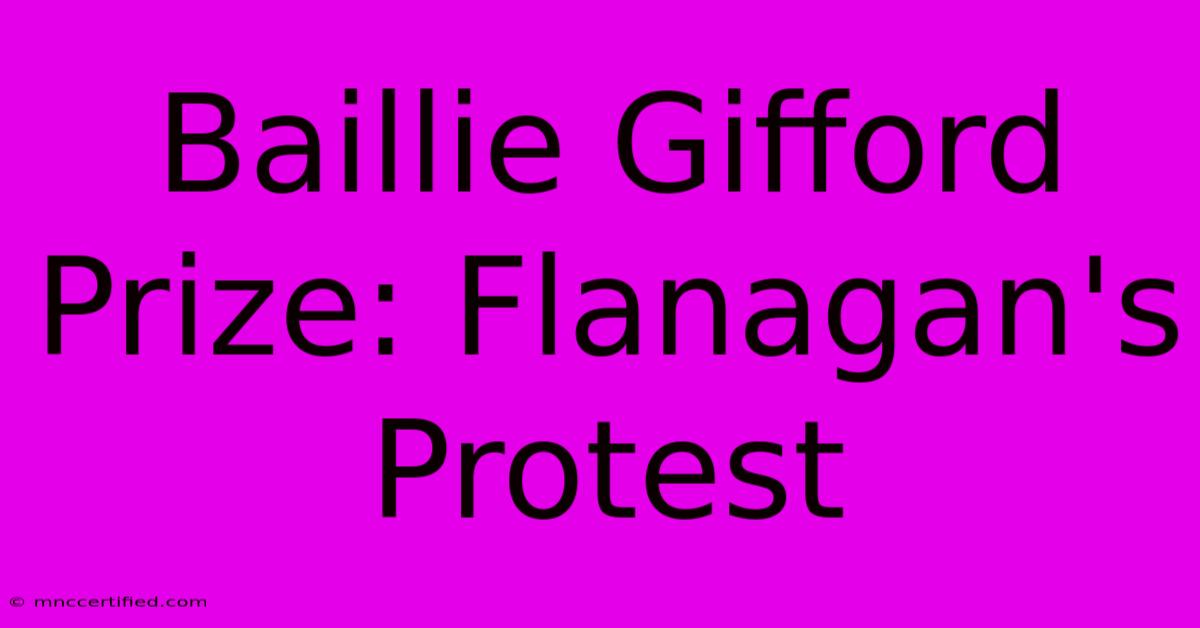Baillie Gifford Prize: Flanagan's Protest

Table of Contents
Baillie Gifford Prize 2023: Sheila Heti's Motherhood and the Ongoing Debate Around "Protest" in Literature
The Baillie Gifford Prize, a prestigious award celebrating the best of non-fiction, often sparks heated debate. This year, the win by Sheila Heti for her memoir Motherhood ignited a conversation, particularly surrounding the perceived lack of "protest" in the winning selection compared to other shortlisted titles. This article delves into the controversy, exploring the nature of protest literature and whether a memoir can effectively function as a form of protest.
The Shortlist: A Diverse Range of Voices and Themes
The 2023 Baillie Gifford Prize shortlist showcased a fascinating diversity of non-fiction works, tackling complex and urgent issues. Alongside Heti's introspective Motherhood, we saw books tackling subjects such as colonialism, climate change, and political upheaval. This diversity alone highlights the difficulty in defining a singular standard for "protest literature." Each book, in its own way, challenged readers to confront uncomfortable truths and consider alternative perspectives.
Beyond Explicit Activism: Nuances of Protest in Non-Fiction
The term "protest literature" often conjures images of direct, explicit activism – think pamphlets advocating for social change or searing indictments of political oppression. However, the power of non-fiction extends far beyond such overt displays. Subtlety can be incredibly powerful. A deeply personal memoir, like Motherhood, can implicitly protest societal norms and expectations by simply presenting a counter-narrative. Heti's exploration of the societal pressures surrounding motherhood, her own anxieties, and ultimately her decision (or lack thereof) to have children, becomes a form of protest against the rigid expectations placed upon women.
Sheila Heti's Motherhood: A Quiet Revolution?
Heti’s Motherhood isn't a fiery manifesto; it's a thoughtful, often humorous exploration of a woman grappling with a fundamental life decision. It's a nuanced portrayal of internal conflict, questioning societal narratives about womanhood and motherhood. This implicit critique, arguably, constitutes a form of protest, albeit a quieter, more introspective one. The book invites readers to reflect on their own assumptions and experiences, sparking conversations that can lead to meaningful social change.
The Power of Personal Narrative: Challenging the Status Quo
The strength of personal narratives lies in their authenticity and relatability. By sharing deeply personal struggles and vulnerabilities, authors like Heti create space for broader societal discussions. Heti’s exploration of her own uncertainties challenges the often-sanitized and idealized portrayal of motherhood frequently found in mainstream media. This act of vulnerability, of revealing the messy realities of life choices, can be a potent form of protest.
The Baillie Gifford Prize and the Definition of "Protest": A Necessary Debate
The reaction to Heti's win underscores the ongoing need for critical discussion around what constitutes "protest" in literature. The judges' decision highlights the evolving nature of activism and the multiplicity of ways in which authors can challenge the status quo. Is explicit political commentary the only form of protest, or can quieter, more personal narratives also contribute to broader social change? This is a question worth exploring and debating.
Conclusion: Redefining Protest in the Age of Nuance
The debate surrounding the Baillie Gifford Prize winner highlights the complexities of defining protest in contemporary literature. While some may yearn for more overtly political statements, the power of introspective works like Motherhood lies in their ability to subtly challenge norms, spark reflection, and ultimately contribute to a wider conversation about societal expectations. This debate, in itself, serves as a reminder of the evolving and multifaceted nature of protest in the 21st century. The prize, therefore, serves not only to celebrate exceptional non-fiction but also to stimulate vital discussions around the role of literature in shaping our understanding of the world.

Thank you for visiting our website wich cover about Baillie Gifford Prize: Flanagan's Protest. We hope the information provided has been useful to you. Feel free to contact us if you have any questions or need further assistance. See you next time and dont miss to bookmark.
Featured Posts
-
Dwp Cold Weather Payment Areas Triggered
Nov 20, 2024
-
Bond No 9 Bleecker Street Sample
Nov 20, 2024
-
Naics Code For Investment Company
Nov 20, 2024
-
Barry Bonds Baseball Cards Worth
Nov 20, 2024
-
Linda Mc Mahon Nominated Education Secretary
Nov 20, 2024